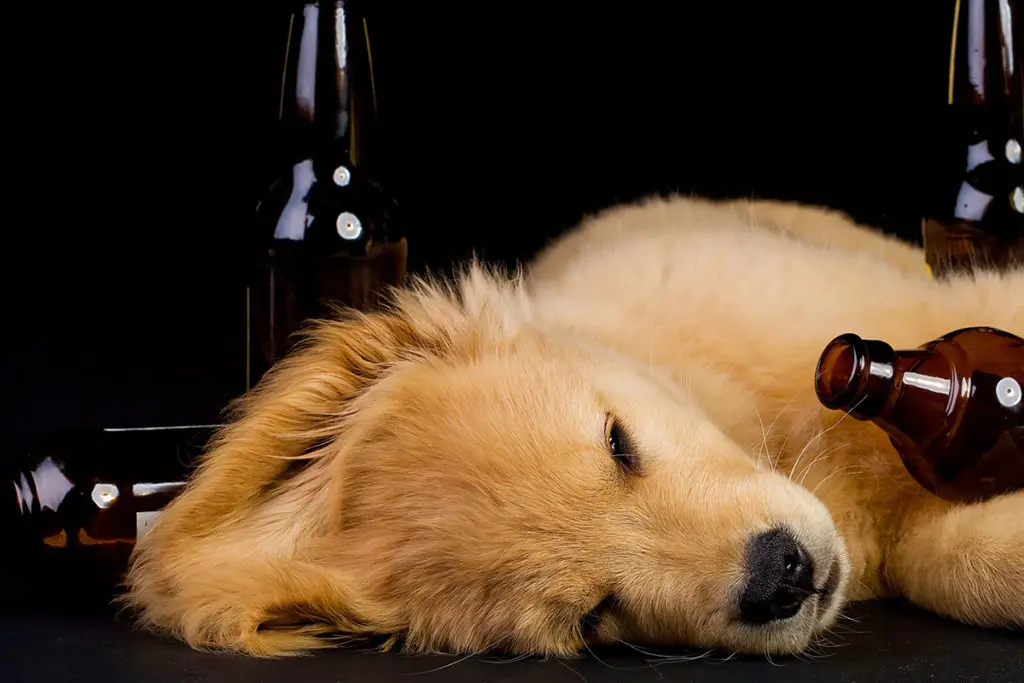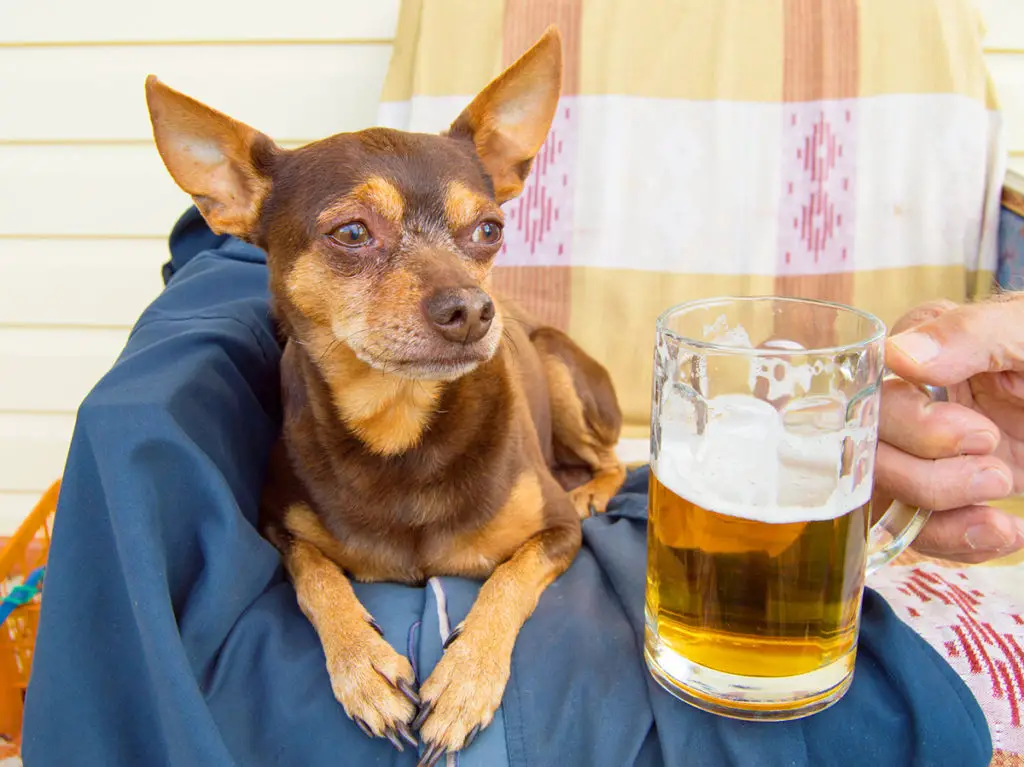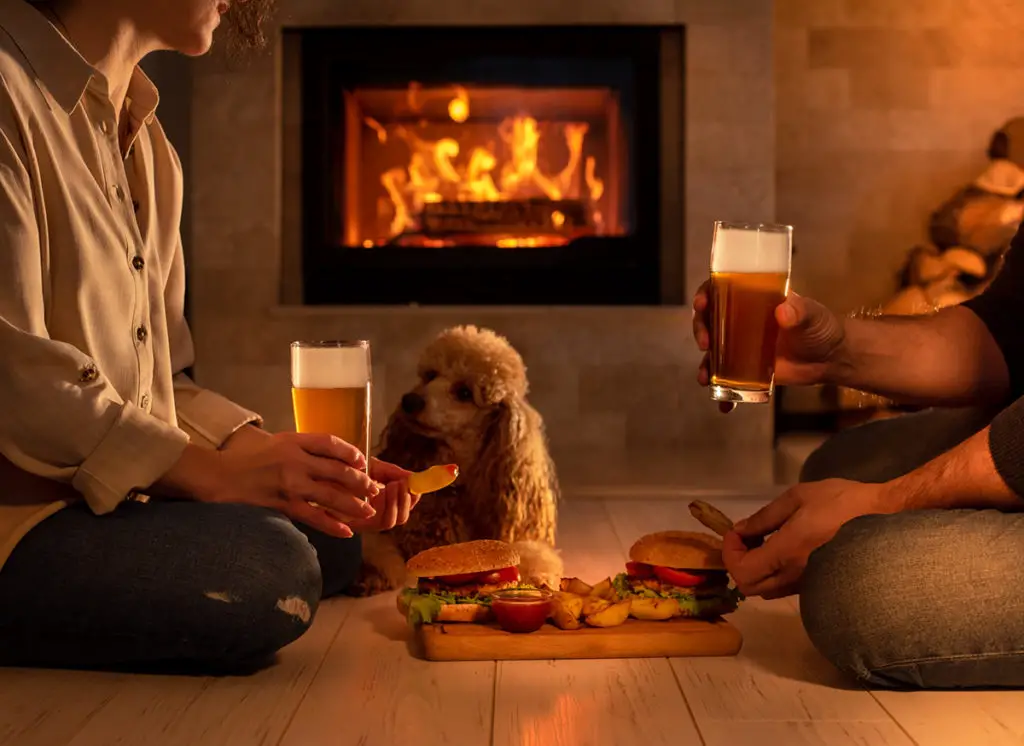Most pet owners love to give their dogs a small bite of their favorite treats. However, there are some treats that dogs should just not consume because they can cause issues for their overall health. So, you may wonder if you can give your dog a little beer?
Dogs shouldn’t drink beer, as it contains alcohol. Unlike humans, dogs cannot metabolize alcohol. As a result, the alcohol inside a beer can cause immediate and long-lasting damage to a dog’s liver and kidneys. Smaller breeds are especially prone to alcohol poisoning as a result of drinking beer.
Continue reading to learn more about why canines and beer aren’t the healthiest combination. I’ll also talk about the many health concerns that come along with canines drinking beer.
Alcohol Is Bad for Dogs
It may seem fun to include our favorite companions in our drinking games, but alcohol can negatively impact your dog’s health. A dog’s body cannot process alcohol in the same way that humans can.
When a person drinks an alcoholic beverage, the various non-alcoholic components of the beer are broken down inside the stomach and intestines. But the alcohol portion ends up in the liver, where it’s broken down by a specialized protein called alcohol dehydrogenase (ADH).
This enzyme transforms alcohol into smaller components, eventually dispersing it through the body in the form of carbon dioxide.
However, dogs don’t go through this biological process after drinking beer or other types of alcoholic beverages.

BEER DROP: Boxes of beer from Award-winning microbreweries → Join The Club
What Happens When Dogs Drink Beer?
Letting your dog lap up part of your beer might seem like harmless fun, but it can have serious consequences. Let’s take a moment to discuss how a dog’s body responds to alcohol to understand why.
When a dog drinks beer, the alcohol in that beer travels to the dog’s liver. But a dog’s liver lacks alcohol-dissolving enzymes, preventing them from metabolizing alcohol. As a result, the stored alcohol damages liver cells, potentially leading to scarring or cirrhosis.
Because a dog’s liver can’t break down alcohol, they tend to experience near-immediate reactions to alcoholic beverages. These symptoms are similar to the effects of binge drinking in humans. The biological effects are also comparable to the effects of binge drinking.
Excessive drinking can damage or destroy liver cells. When this happens, internal scarring (called cirrhosis) occurs.
Because dogs can’t metabolize alcohol, even the smallest amounts of beer can destroy their liver cells and lead to scarring. It can also increase a dog’s risk of developing liver cancer.
Dogs that drink beer regularly are also prone to developing fatty liver disease.
Repetitive excessive drinking in humans can trigger the liver to develop extra layers of protective fat. This process leads to fatty liver disease. When dogs drink beer or alcoholic beverages multiple times, they’re also at risk of developing this ailment.
Are Some Dog Breeds More At Risk?
The symptoms and severity of alcohol poisoning are different in each dog. But small breeds tend to experience more immediate and noticeable reactions than larger breeds. For this reason, beer can be deadly to smaller breeds like Terriers, Chihuahuas, and Pomeranians.
The weight and size of a dog influence the severity of alcohol’s effect on their liver. This concept also applies to humans. Tall individuals with plenty of muscle tissue (which is heavier than fat) become intoxicated less quickly than short-statured individuals with less muscle tissue.
For this reason, large muscular breeds may be less likely to suffer intense consequences or noticeable symptoms of alcohol poisoning than small low-energy breeds.
However, it’s crucial to note that any amount of alcohol, especially beer, can cause both short-term and long-term damage to a dog’s body. After all, beer doesn’t solely consist of alcohol. Its other components can be just as toxic to dogs.

What Makes Beer Harmful for Dogs?
All types of alcohol are just an overall bad idea for your dog. But beer contains ingredients that can be particularly harmful to dogs.
Beer contains grain alcohol, which can be just as toxic as other types of substances. Even the smallest amount of consumption can produce unhealthy and dangerous symptoms for your pet. More so, beer is produced with “hops” and “ethanol,” which contributes specifically to alcohol poisoning.
One of the most dangerous parts of beer for your canine is hops. However, the question remains: what are hops?
Hops are flowers that have a green color, and they help give beer its delicious taste and smell. Unfortunately, this flower is very dangerous for dogs although it’s delicious to most people. It doesn’t matter how a dog gets ahold of this type of flower, their body will react shortly after.
Hops can produce unfortunate symptoms about a half-hour after consumption. Your dog will, most likely, display:
- Panting and heavy breathing
- Pacing or a sense of anxiety
- Throwing up and vomiting as well as common stomach issues
- A high temperature
It’s important to watch over your dog if they do consume this flower because symptoms don’t always occur as quickly as thirty minutes after consumption, and it’s best to treat it as soon as possible.

Symptoms of Alcohol Poisoning in Dogs
If your dog consumes any alcohol from a drink or food you are consuming, it’s suggested to take them to the vet for immediate help. Here are also a few symptoms to look out for:
- Your dog displays lethargic or unfamiliar energy.
- Your dog begins to throw up or has muscle tremors.
- They’re dizzy or wobbly as they walk around.
- They’re breathing slowly.
- Your pet is confused and is having trouble walking around and paying attention.
- They have low-body temperature, and might even be thirsty.
- Your pet is acting strange.
- In stronger cases, seizures are also a warning sign and symptom.
If you’re not sure whether your best pal has had a large dose of alcohol or if they’re not displaying too many symptoms, it’s still best to lean on the safe side. If you can, give your local vet a call to ask for further help or take them in for a check-up as soon as you can.
Some of the solutions your vet may consider are:
- Giving your pet an IV drip.
- Close monitoring with overnight care.
- Different methods of measurement to help with rehydration.
How to Prevent Alcohol Poisoning in Dogs
Dogs are innately comfortable in the wild and have adapted to the human lifestyle. The foods they eat or like are usually specific to their kind.
Alcohol isn’t something that dogs naturally are drawn to. Rather, dogs are attracted to smells and seek out foods they know they’ll like. Fruit-based drinks and beers that have fruitful flavors are more likely to get the attention of your canine than a regular beer.
Additionally, a lot of canines will seek to eat what they find just for the sake of it, and they don’t think too much about it. Canines can have stubborn personalities when it comes to eating, primarily driven by their need for sustenance.
Dogs like to indulge in sweet flavors, and they can sense that beer and alcohol, in general, has a sweetness about it. Our pets don’t know that alcohol is bad for them or that they’re desiring an alcoholic drink.
Just like chocolate, dogs will seek what they like rather than knowing all the facts beforehand. Some drinks are also very bitter, and dogs will react to that. Even if your pup loves the flavor of beer, they might, on the contrary, avoid some alcoholic drinks because they can smell the flavor and don’t like it.
There are many harmful risks that come along with beer and alcohol, but there are still solutions to help your dog avoid a toxic situation. Even if you decide to drink alcohol around your dog, you can provide your best pal with an environment that’s safe and warm for you and them.
Here are some easy-to-follow solutions for helping your dog:
- Purchase dog-friendly beer like No products found. (Amazon), so they can enjoy the taste of beer without the issues of alcohol or hops.
- Keep all alcoholic products stored away out of reach from your pet. When consuming them, make sure you’re careful and keep your dog far away from them.
- Watch your beer, and make sure to clean up any spills right away.
- If your dog happens to take more than a lick of beer, take action as soon as possible.
- Be protective over your dog’s overall health, and keep beer that anyone has away from them.
Conclusion
Beer and alcoholic beverages, in general, aren’t good for your dog. They can create alcoholic poisoning and dangerous health concerns for your pet.
If you can, keep your pet away from beer. And, feel free to reach out to your vet if you ever have any oncoming health concerns.
If your dog truly loves alcohol and you love sharing your drinks and snacks with them, go ahead and try a dog-friendly “alcoholic” drink. People can usually drink them, even though they aren’t too flavorful, and they’re safe for dogs.
